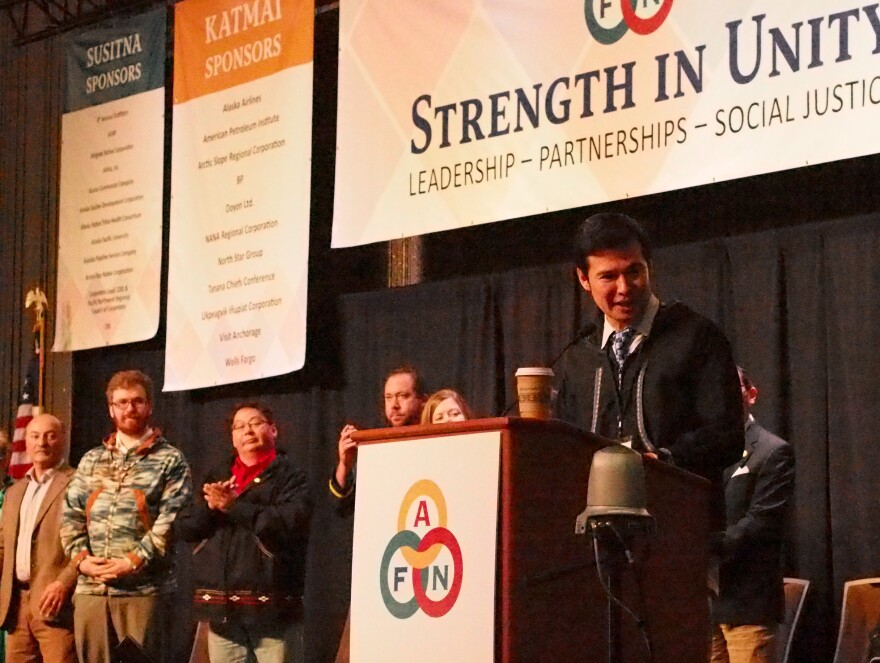On the second day of this year’s annual AFN gathering in Anchorage, another significant announcement regarding the relationship between the state and tribes was put forward.
Delegates were told of a major new decision by the state Attorney General’s office, which seeks to resolve decades of legal battles by concluding that Alaska’s 229 tribes are fully sovereign entities. The move is a win for tribal and indigenous advocates who have long-contended they have equal jurisdiction and standing with the State of Alaska. The news came just one day after the governor signed an unprecedented compact with tribal entities that gives them potential control over child welfare policies.
Richard Peterson chairs the Governor’s Tribal Advisory Council and is president of the Central Council of Tlingit and Haida Indian tribes
“I don’t know if the gravity really is hitting everybody, but we’ve been arguing for recognition since statehood, and under this administration the attorney general has provided an opinion that yes tribes do exist, that we have inherent sovereignty,” Peterson said.
According to Peterson there’s little in the 16-page guiding document that will dramatically change current policy. But he offered the Village Public Safety Officers program as one example of where tribes have had lesser standing than the state in bringing safety measures to tribal communities in rural Alaska. Going forward, he said tribes will be in a better position to develop and implement policy.
“I don’t even know that it’s leverage – equity isn’t exactly leverage, it’s putting us all on the same playing field," Peterson said. "I just look forward to being able to work together with a sense of equality and accomplish things for all Alaskans.”
The opinion, authored by Attorney General Jahna Lindemuth, says that ambiguity has come in part from misinterpretations over whether or not the Alaska Native Claims Settlement Act nullified tribal sovereignty in Alaska. The guidance clarifies that ANCSA did not.
Delegates heard from the Legislative House Bush caucus. Representative Neal Foster of Nome laid out work the group has done for Alaska Natives, including protecting the VPSO budget from cuts, keeping the minimum student enrollment number for rural schools at 10, and trying to secure more drug treatment options. Foster said that going into lawmaker’s fourth special session next week, caucus members are opposed to fiscal measures that will have a disproportionate impact on residents living off the road system.
“Part of that means we must not balance the budget on the backs of rural Alaska,” Foster said.
The convention saw a panel on climate change immediately after a presentation from a Newtok resident about a resolution going before delegates. If passed, it would support putting disaster relief resources towards dozens of communities facing erosion and near-term effects from climate change.
And AFN’s most prestigious awards were announced. They included the Della Keats “Healing Hands” award for providing health care in native communities. This year it was given to Ethel Lund, one of the founders of the Southeast Alaska Regional Health Consortium, or SEARHC. Lund flew up Friday morning from her home in Juneau, and in spite of difficulties speaking from Parkinson’s, she said that at her august age, she sees indigenous causes improving.
“I remember the first time I was called an elder, and I wasn’t ready for it yet. I was only 72,” Lund exclaimed.
AFN wraps up on Saturday, when delegates will hear from all three members of Alaska’s congressional delegation and vote on this year’s draft resolutions.



